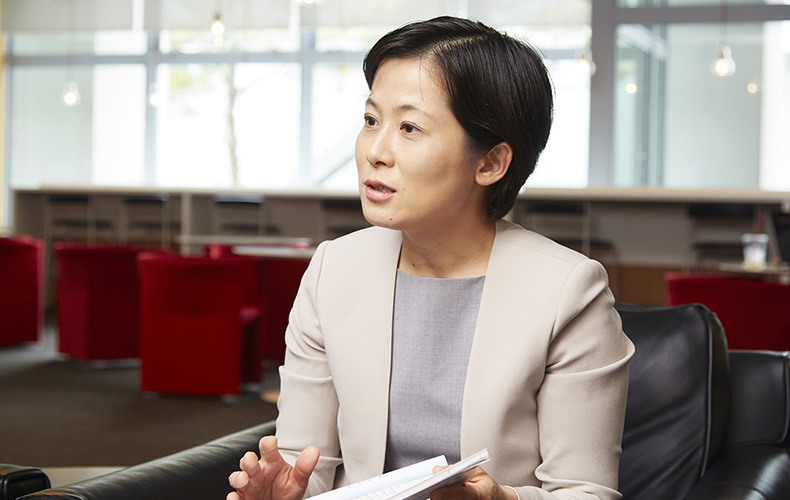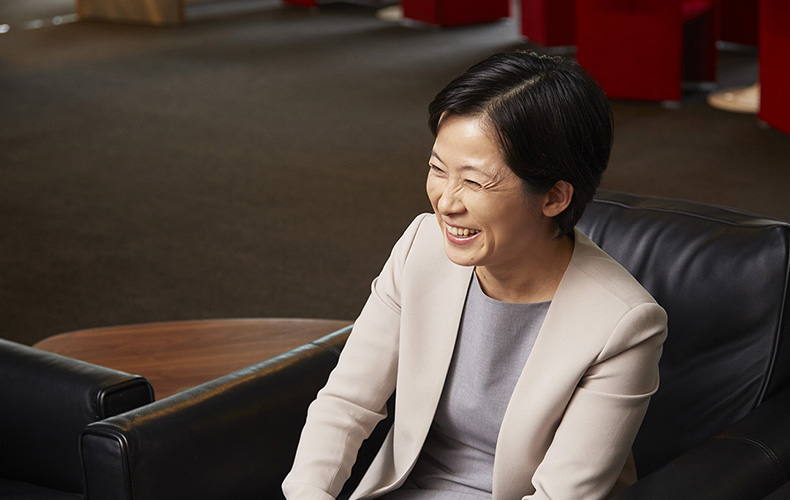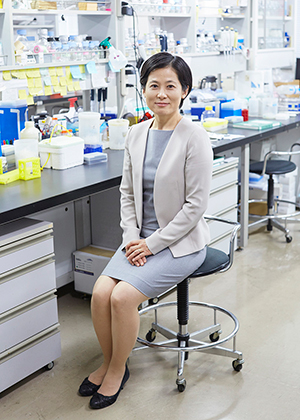Team Leader of Cell Function Research Team at RIKEN Center for Sustainable Resource Science,
1993 B.A., Division of Natural Sciences (then), College of Liberal Arts

Toward building a more sustainable society: beyond disciplines
RIKEN Center for Sustainable Resource Science (CSRS) defines its overall mission as aiming at "production of biological and chemical resources without placing a load on the environment." To put it more specific, we pursue, from a scientific point of view, efficient production and utilization of plant resources that are indispensable for living, which includes food, pharmaceuticals and cosmetics.
At CSRS, the research team I lead as a Principal Investigator (PI) focuses on the two themes of "development" and "regeneration." "Development" focuses on the process in which seeds germinate and develop leaves and flowers, while "regeneration" looks into how plants repair themselves when they get injured. What is very interesting is that plants have overwhelmingly high capacity for regeneration compared to us humans and other animals. Taking dandelions for example, they can even develop leaves from a root, which are entirely different tissues. We take it as our mission to save the world from resource depletion and food shortage by creating plants that are stronger and have a higher regenerative capacity by understanding the mechanisms of development and regeneration.
My team consists of about 10 researchers and students. Since I am the PI, I bear the ultimate responsibility for our researches. It's like managing a small company of my own. The most important part of my job is to decide on which direction to take in our research, but I also spend time for training young researchers, public relations, and fund raising, among others. However, I ask my team members for their opinions whenever I have any doubt. Most of them are researchers or graduate students hoping to become PIs themselves, who are all highly capable and knowledgeable. We develop ourselves by learning from each other as we devote ourselves to research toward a sustainable society that effectively recycles plant resources. At CSRS, there are also other teams that approach the common goal of effective utilization of biological resources from perspectives different from ours. I think that being able to consult and exchange views with researchers of other fields on a daily basis is one of the greatest advantages of working at CSRS.

The attitude that I had built at ICU supported me during my research abroad
Now I have settled down to study plants, but, looking back at my high school days, my curiosity was all over the place. I was interested in both natural science and linguistics, so much that I even had an ambition to "explain the effects of the medicinal herbs understood in oriental medicine using the language of Western science." That's why I decided to enter ICU, because I was strongly attracted to the concept of liberal arts education. I remember myself thinking "I want to make decisions in my life based on a broad perspective and knowledge."
My life at ICU was filled with discussions. I remember that, shortly after I entered ICU, I attended a class where students were asked to discuss the theme "College thinking" in English. Needless to say, the language barrier was one challenge, but what was even more challenging was learning how to discuss things in a logical manner. Day after day, discussion skills were hammered into me through and through. I continued to engage in discussions in my second year and on, because ICU had a culture of casual discussion. I often discussed with my friends whatever topic that caught my curiosity. Also, ICU education emphasizes critical thinking, in other words, the attitude to "doubt all that is usually taken for granted." This attitude is very important not only in daily life but also in the world of science. I was able to pursue highly-original ideas in science, thanks to the critical thinking I acquired at ICU. When I was engaged in research overseas, I was able to discuss matters on an equal basis with the people around me, because I had the attitude to view things from a critical perspective and create new ideas in a logical way, which I had built through continuous exchange of views with my teachers and friends at ICU.
I gained a glimpse into the fascination of scientific research while studying at ICU and decided to proceed to graduate school to advance my research. When I was in my first year of a master program, I attended an international academic conference, which had a great impact on me. Researchers, about whom I only knew through journals and their papers, were there in front of me to present their research results, and all participants carried out a deep and serious discussion on one theme. As a fledgling researcher trying desperately to catch up on the discussion at the back of the conference room, I strongly felt that I would not be able to become a real researcher unless I step onto the world stage and join the circle of these participants. Because I had already considered the option of studying abroad when I chose to enter a master's program, I didn't hesitate to go abroad as the next stage and earned my doctor's degree in the Australian National University. Subsequently, I had the chance to continue research at the John Innes Centre in England, which offered a wonderful research environment, and now I'm a member of CSRS. I've been with RIKEN for around 10 years. So it's been more than 20 years since I graduated from ICU, but I feel that the logical and critical thinking and the ability to create I gained in ICU have formed my basis.
"Global arena" as the playing field for Japanese science community
I feel that I and my team are pursuing a very interesting research. We are now embarking on the era in which we will be able to freely recombine genes using a system called CRISPR-Cas9 which enables genome editing. Although some ethical issues remain to be solved, on the technological front, producing as much food and resources as necessary will be no longer a dream with a little further advancement of research. One bottleneck that is preventing us to reach that stage is the issue of regeneration, which is our research theme. Certain breakthroughs are coming through on the basic research level, and we expect to achieve specific outcomes in a short period to come.
On the other hand, I personally think that further internationalization of scientific research in Japan is an important issue. Although the government is starting to enhance various programs, a majority of Japanese students still lack research experience abroad. Correspondingly, I think that many researches carried out in Japan are very interesting and promising but have not been duly recognized in the world. When one experiences a discussion with non-Japanese person for the first time without ever having the kind of chance until he/she graduates from university or graduate school, one cannot help but recognize them as an enemy because of cultural differences. In today's world, however, it would be such a pity if competent researchers should limit their playing field within national borders. I want to raise awareness in the Japanese science community that we should actively step out into the world to play in the global arena.
One attempt I recently made was to host an international academic conference in Japan. A prestigious international conference named Cold Spring Harbor Laboratory (CSHL) meeting is regularly held in the United States. A spin-off conference, Cold Spring Harbor Asia Conference has been held in China since several years ago. When I first participated in the Asia Conference, I was deeply impressed at its high quality. Hot discussions were taking place among participants of various generations, including students. When I saw this, I knew that we should do this in Japan, too. The CEO of CSHL agreed with my proposal and the Cold Spring Harbor Asia Conference was held at Awaji Yumebutai International Conference Center in November 2016. I served as the organizer of the conference, which enjoyed participation of 230 people from 23 countries of the world. It was delightful to see so many participants actively exchanging their views here and there in the venue, which was exactly what I had hoped to see. Everything, from seeking sponsors to selecting the venue, had to be managed from scratch since it was the first time to hold a CSHL conference in Japan. I faced a lot of difficulties, but my ability to create new things I gained at ICU helped me through the way to success.

All we need is the experience of dialogue to create the world where we empathize with others
What I would like researchers who will lead the next generation to keep in mind is to explore the world outside Japan and to expand their knowledge to realms outside of their specialized fields.
You will be able to catch up even if you lag behind a little in your specialized field. To put it the other way around, you have to continue learning, or you will be left behind the times. On the other hand, also in scientific research, it all comes down to human relations. Learning more about religions and philosophies will facilitate understanding between people of different backgrounds, opening up a new horizon that you have never seen before. At the conference held in Awaji Island, participants would spontaneously get together at the hotel bar in the evening and talk about research and life in general enthusiastically. Perhaps they picked up some hints that would lead to future discoveries or ways of lives. How good one is at sharing and expanding exciting views with others, I think, depends on the person's scope of experience in holding dialogues with other people.
I myself often exchange opinions with someone I just happened to meet in an academic conference. Thankfully, whoever the person is, I can manage to immediately determine the right attitude to take and spend time that is meaningful for both of us. I think this is because I have had dialogues with a wide variety of people in my life.
Profile
Keiko Sugimoto
1993 B.A. in Arts and Sciences (Natural Sciences)
Ms. Sugimoto entered the Division of Natural Sciences, College of Liberal Arts, ICU in 1989. She studied at University of California, Davis on an exchange program in her third year at ICU. After graduation, she proceeded to Graduate School of Osaka University, where she earned her master's degree. Subsequently, she attended Australian National University as a scholarship student and moved to the U.K. to continue research at the John Innes Centre, world's leading research institution in plant research. She was appointed as group leader at the John Innes Centre, where she served for about 7 years. She joined RIKEN in 2007 and currently also holds a professorship at the Graduate School of Science, The University of Tokyo.




